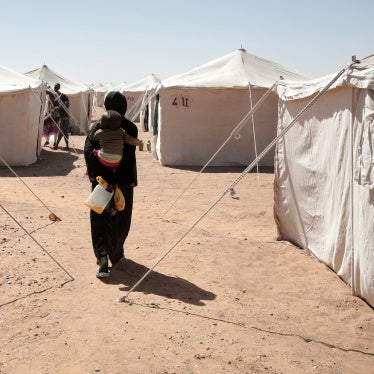High Commissioner, Human Rights Watch warmly welcomes you in your new position as UN High Commissioner for Human Rights.
High Commissioner, Human Rights Watch warmly welcomes you in your new position as UN High Commissioner for Human Rights.
You assume this role at a critical time for human rights within the UN system and in the world. Your office is confronted with a challenging array of attacks not only on human rights, but on the human rights legal framework. The struggle to combat terrorism has been used to justify a frontal assault on some fundamental human rights, including the prohibition of torture and cruel, inhuman and degrading treatment. The right to free expression is also under attack from those who want to curtail speech as part of counter-terrorism strategies, while legitimate concerns about threats or discrimination against religious groups have led to a campaign aimed at blocking “defamation of religions” that also endangers freedom of speech and belief.
The fundamental principle that those responsible for human rights abuses should be held to account for their crimes is constantly being challenged. Your leadership will be essential to defend the universal application of human rights standards and protect those standards from dilution.
High Commissioner, your mandate places you in a unique position to open a broader dialogue with UN member states on the universality of human rights standards and their own responsibilities to help ensure human rights protection around the globe. As you have mentioned, your distinguished career and personal experience provide a strong basis for you to bridge tensions that have polarized discussions on human rights in multilateral settings, and to provide guidance in debates over crucial issues such as racism, discrimination, xenophobia and related intolerance, particularly in the context of the Durban review conference.
Human Rights Watch appreciates OHCHR’s efforts to promote and protect human rights around the world. In your statement you recognized that the expansion of field operations constitutes a step in the right direction. In this context, we welcome that OHCHR has carried out an assessment mission in Somalia and would like to encourage you to considerably strengthen your team working there, in order to carry out the mandate of Security Council resolution 1814 more effectively.
Human Rights Watch is gravely concerned by the dramatic deterioration of the situation in Somalia since 2006. Somalia’s civilian population is caught between warring parties that have shown utter disregard for international humanitarian law and fundamental human rights. Human rights abuses have become a central component of the way Somalia’s warring parties have engaged in this conflict.
We believe that the Human Rights Council and OHCHR can work together to strengthen the response of the international community in Somalia. In this connection, you have reminded us that development, security, peace and justice cannot be fully realized without human rights. But this is often forgotten in Somalia. We therefore urge you to support the idea of the holding of a special sitting on Somalia at the HRC, with the aim of mapping and assessing the human rights needs in the country, together with the support of the Independent Expert.
High Commissioner, you have also spoken of the need to “break the cycles of violence, the mobilization of fear and the political exploitation of difference”. The situation of civilians caught in the armed conflict between Georgia and Russia speaks clearly to this need. We would like to encourage your office to deploy a mission to investigate abuses committed since the onset of this conflict on August 7. Human Rights Watch has documented serious violations of human rights and the laws of war committed by all sides to the conflict, including Russian and Georgian armed forces as well as irregular militias. Your office can play an important role in establishing a credible and impartial record of the human rights situation in the region.
Lastly, as we celebrate this 60th anniversary of the Universal Declaration of Human Rights, we would like to reaffirm the principle of universality which requires that all human beings are entitled to the full enjoyment of all human rights and the principle of non-discrimination on the ground of sexual orientation. In this connection the Yogyakarta Principles on the application of international human rights law in relation to sexual orientation and gender identity provide a sound jurisprudential framework for addressing these issues, and include constructive recommendations to your office.
High Commissioner, we would like to wish you great success for the future and look forward to working with you.







